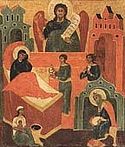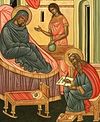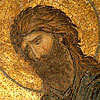

| Previous day | Next day |
| Old Style
January 7
|
Saturday |
New Style
January 20
|
| 33rd Week after Pentecost. Saturday after the Theophany. Tone 7. | No fast.
|
![]() Afterfeast of the Theophany.
Afterfeast of the Theophany. ![]() Synaxis of the Holy Glorious Prophet, Forerunner, and Baptist John.
Synaxis of the Holy Glorious Prophet, Forerunner, and Baptist John.
![]() St. Pachomius of Keno Lake (16th c).
St. Pachomius of Keno Lake (16th c).
New Hieromartyrs Paphnutius (Kostin), hieromonk of Optina Monastery (1938) and Nicholas (Parfenov), bishop of Atkarsk (1939). New Hieromartyr Risto Jaramaz, priest, of Montenegro (1942).
St. Brannock (Brynach) of Braunton, England (6th c.). St. Cedd, bishop of Lastingham (664). New Martyr Athanasius of Attalia and Smyrna (1700).
Thoughts for Each Day of the Year
According to the Daily Church Readings from the Word of God
By St. Theophan the Recluse

Thursday (Synaxis of the Forerunner). [Acts 19:1–8; John 1:29–34]
Saint John bore witness of Christ Jesus, that He is in truth the Lamb of God, Which taketh away the sin of the world (John 1:29), that He is the promised Deliverer, awaited by all. Those who were near him heard this and believed. From them this witness passed on to the people, and everyone began to think that he of whom John bore witness was not an ordinary man. The Saviour pointed this out when in the last days in the temple, he proposed to the heads of the temple a question: whence was the baptism of John, from heaven or of men (cf. Mark 11:29)? They refrained from answering, because it was impossible for them not to see that John came baptizing with water not of himself. But if they were to say this, they would immediately have to acknowledge John’s testimony that the Promised One was before them, and therefore be compelled to submit to His teaching. But they did not want to submit, not for any well-founded reasons, but solely because of their prejudice. But their obstinacy does not in the least lessen the power of the witness of St. John. To this day, it is as certain as it was when it came forth from his mouth. We hearken unto John who shows us the true Deliverer; and through this we enliven our faith, as a faith which has tangible proof behind it.
Saturday after Theophany. [Eph. 6:10–17; Matt. 4:1–11]
The Apostle clothes Christians in the whole armour of God. It is appropriate that this follows the previous lesson. For, if someone, heeding the call of God, has taken on the beginning of a new life through God’s grace, providing for his own part all diligence (II Pet. 1:5), then he must not expect to rest on his laurels, but rather to struggle. He has left the world—for that the world will begin to press him. He was saved from the power of the devil—the devil will chase after him and set snares before him, to throw him off the path of good and drag him back to his domain. He has denied himself, denied selfishness together with a whole horde of passions. But this sin living in us will not suddenly relinquish its free and untrammelled existence as we live in self-pleasure, and every minute it will attempt under various pretexts to establish once more the same life routine that so richly filled and fed it earlier. These are three enemies, each with innumerable hordes; but the commander-in-chief is the devil, whilst his closest helpers are the demons. They run the show in a sinful life—the opponents of a spiritual life. That is why the Apostle arms the Christian against them as if there were no other enemies at all. He says: we wrestle not against flesh and blood, but against principalities, against powers, against the rulers of the darkness of this world, against spiritual wickedness in high places (Eph. 6:12). If they did not exist, perhaps battles would not exist either. Likewise, as soon as they are repelled and struck down, it takes nothing to repel and defeat the others. So each of you look to see where you need to direct your arrows, or at least look to see from which side you particularly need to defend yourself. Then, defend yourself! The Apostle prescribed several weapons; but all of them have power only through the Lord. That is why experienced spiritual fighters have passed on to us this instruction: “Strike the enemy with the name of the Lord Jesus!”
Articles
 Nativity of the Holy Glorious Prophet, Forerunner and Baptist, John |
 St. John the Baptist |
 Saint Pachomius of Keno LakeSaint Pachomius founded a monastery dedicated to the Transfiguration of the Lord near Lake Keno, and tonsured Saint Anthony of Siya (December 7) as a monk in 1508. |
 St. Brannock of BrauntonSaint Brannock lived in the sixth century, and tutored the children of the Welsh ruler Brychan. |
 St. Cedd of LastinghamSaint Cedd was a missionary and bishop who spread the faith throughout England during the seventh century. |












